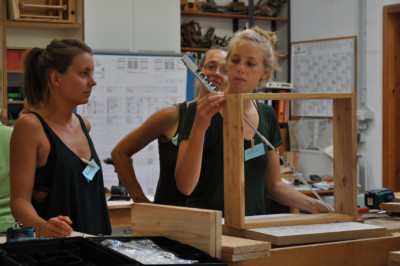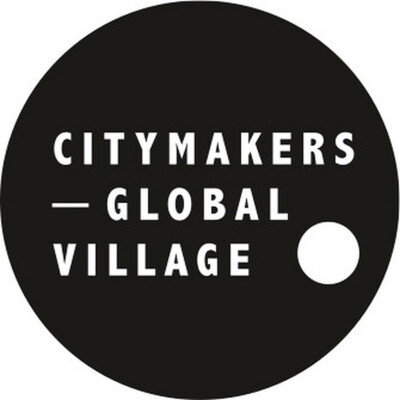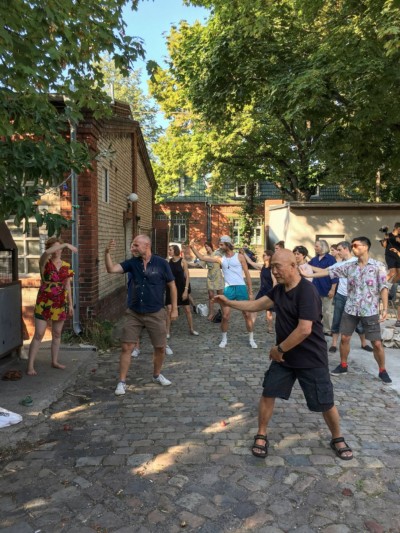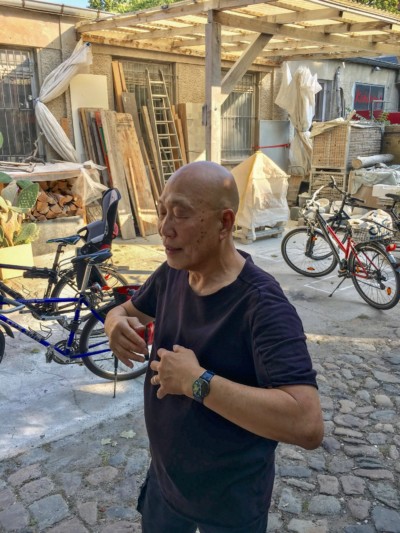Im Rahmen des CITYMAKERS Weißensee-Mappings entdeckten wir die “Baufachfrauen”: An ihrem Sitz in der Lehderstraße in Berlin Weißensee bilden die sie in einer Werkstatt Tischlerinnen aus und betreuen von hier aus zahlreiche Projekte in ganz Berlin.



Listen to the Podcast by Kika Yang
Feng Shui means literally “wind and water” and is a traditional Chinese method to create harmony of people and their environment. In the past, it was often used to determine ideal places for graves, while in modern times it is used more and more in architecture, landscaping and interior design. It is based on Daosim and different Chinese concepts like Yin and Yang, Five Elements and Qi. Coincidentally, the office of arqitektur is situated right opposite the courtyard where Constellations / CITYMAKERS China – Germany is based. So there are two anchors of China and Chinese culture right opposite each other on Langhansstraße, separated only by the tram lines M12 and M13 that connect Weißensee’s east with Wedding and the center around Friedrichstraße. The recent focus of the CITYMAKERS program on Weißensee offered a perfect opportunity to learn more about Howard’s connection to this part of Berlin and how he applies his training in Feng Shui to this place.
On a sunny day in July 2019, Howard Choy came to the spacious Constellations office to answer questions by CITYMAKERS editors Kika Yang and Maja Linnemann. With Howard being a very joyful and animated speaker, the three spent a very entertaining and informative afternoon.
Why did you choose to study architecture?
I would like to say, it is architecture that called me. When I was in high school I had no idea what I wanted to do. Like many Asian parents mine wished me to become a doctor. But in the first year, I failed 3 exams out of 4. At the same time, I helped my girlfriend, who studied architecture, with her homework. I realized that I found that very easy and natural. When I changed to architecture as a subject, I started with 200 students but after the first year I came out among the fist ten. I was passionate about it and it was easy for me to visualize three-dimensional space. I felt I could actually walk through the space I designed when I closed my eyes. It never felt like work, though it is more in where the creative part was concerned and less when it came to the technical side. Actually many of my tutors were German Jews at that time, who came to Australia before Word War II, so through them I became exposed to the ideas of the Bauhaus early on.
What kind of work did you do as an architect in the past?
I mostly designed residential buildings and worked a lot for Asian clients. I think it is absolutely fascinating that as an architect you can create something where people actually live, love, raise children and die in. Recently when I was back in Sydney, I went to a restaurant, which I designed 30 years ago. It was still the same owner and he had not changed a thing. He was still satisfied with what I did then. So when it comes to architecture, what you create will still be there when you die, and it gets used, it is functional. You cannot live in a painting or a statue, but you can live in a building.

How did you first get in touch with Feng Shui?
I met my first teacher, Master Ren Zhilin, by chance in Hong Kong when I was a young man of 27 or 28. On the spur of the moment I asked him if I could study with him. He had no family in Hong Kong and lived in a cubicle in a tenement in very simple conditions, although he took high consulting fees from his rich clients. I do not know what he did with the money. He never asked me for money, and he always paid for my meals. When I left after two years, he gave me his compass, his notes and an incredible calligraphy. When I went back to Australia, nobody was interested in Feng Shui, I only took it up again many years later.
But since I had been interested in Chinese martial arts when I was a teenager – purely to impress girls (laughs) – and later also in Taiqiquan and Qigong, I found that Feng Shui is in perfect synergy with those exercises and my work, because it is all about moving in 3D space. In martial arts as in Feng Shui, it is also important how and where you position yourself.
I also studied with academics, like Prof. Wang Yude of Central China University in Wuhan, and Prof. Cheng Jianjun, of South-Eastern Normal University in Guangzhou, and with practitioners like Master Wong, whom I might call a charlatan. Master Wong set up his shop in Temple Street in Kowloon every night for 30 years. He mostly played with two human emotions, hope and fear. But in hindsight, Master Ren Zhilin was really the best teacher, who laid a solid foundation for me, although at the time I did not appreciate him enough. But I guess that he must have known that I would become a Feng Shui practitioner at some point.
Many people have heard of Feng Shui and have an idea what it means; what are the important aspects that YOU would like to stress?
I use Feng Shui mostly as a design methodology, as a method to analyze a situation, a physical situation but also a mental situation. I can use it to tell the future to some extent, or to help people to solve a relationship problem, but that it not my main aim.
When I do a Feng Shui analysis I look at the Yin and Yang layers: like light and dark, wide and narrow, rough and smooth and so forth to read the Qi. The building preferences always go to Yang. When you have looked at all the layers, the answers will come up naturally.
Feng Shui is about the relationship between the individual and the environment. As a Feng Shui consultant, I raise my client’s awareness of the environment, without making any decisions or judgments. Once they become aware, they find their way.
What is the practice of Feng Shui nowadays in China?
There are some weird practices like finding a good place in the countryside and bury your DNA there, like hair or fingernails, and then hope that the earth Qi nourishes you. Anyway, there is generally a big misunderstanding about what Qi is. Most people think it is some kind of force. But if it were a force you should be able to measure it, right? I have a German friend who wrote his PhD about Qi. After 15 years of research he still could not explain to me what Qi is with clarity.
So what do you think Qi is?
In a book written by a contemporary Chinese philosopher, Zhang Dai’nian and translated by Edmund Ryden, I read that the nearest way of how you can describe Qi is similar to Einstein’s theory of relativity. In Einstein’s theory, energy and matter are interconnected through light, which is a constant.
To take a knife as an example: we can measure the material side of it, its length and weight, but we cannot measure, what one can do with a knife. It can cut, hew and kill people depending on who uses it. This potential to change or to do something that we cannot measure is its Qi. How the Qi manifests itself always depends on the situation or the person who uses it. With Einstein, the light is a constant, but in Chinese thinking the Qi is relative to the context of a situation. Whenever I asked my Feng Shui teacher something, he always said: “It depends”, which can be very frustrating. But it is the basis of Chinese thinking, the Yin and Yang, the form and the formlessness always co-exist together. When I do Qigong, for instance, even though it may be the same exercise, I never do the same thing twice; it is always different, depending on the weather, my mindset or other factors. You can feel the difference, but it is difficult to describe, and it is not repeatable. The concept of Qi is like water, when you try to grab it it runs away.
From a Daoist point of view, to live a good life, you always should find the way in-between, a balance between light and dark, but the in-between is never the same either.
Do you think it is more difficult for Westerners to understand the concept of Qi?
No, it is difficult for Asians, too. We have a saying that “it is difficult to be muddleheaded”. It is easier to be clear than to hold Yin and Yang, the opposite poles, together.
How often do you go to China and how connected to it do you feel?
It is interesting – outwardly I am moving towards the West: from China to Hong Kong, from Hong Kong to Sydney and from Sydney to Berlin. But inwardly, I travel in the other direction, back to old China, its philosophies and cultural practices, etc.
I have no close relatives in China anymore but I travel there once a year because I am interested in classical Chinese culture. Of course, you do not find much of it in the modern cities, which makes me feel quite sad; that we gave up this more holistic thinking for the present materialistic thinking.
I hope that some of the traditional values can be preserved in the countryside, like in Japan or Korea. There are some architects now who work in remote places in China who work in this direction and that gives me hope.
What is home for you?
When I lived in Sydney, I lived in the back of my office for some time and had to build an extension there. Subconsciously, I designed this extension almost exactly in the same way as the room in Guangdong where I was born and lived until I was seven. So it appears that the memory of space is deeply ingrained within us. Home is where my heart is.
How long have you lived in Berlin and why did you move to Weissensee?
My wife is from East Germany, and she moved to Berlin after the Wall fell. Somehow, we are drawn to this part of Berlin because of my Feng Shui experience. When we looked for a new space, my wife said ‘you are a Feng Shui expert, why don’t you look at Berlin and choose a place for us to work?
Well, when you look at the map of Berlin, there is the Ringbahn that keeps the property prices high inside. Because of our financial situation we needed to look at somewhere outside the Ringbahn, and since we lived in Pankow we wanted to find something nearby, that is a ”nodic point” in Feng Shui where the railway and the express way come together. So I jumped on my bicycle and looked at Weissensee where I found a property for sale on Langhansstraße. My wife talked to the owner, an old lady, but they could not agree on the price. For 12 months I was looking at many other places in this area, but for one reason or other we never closed the deal. After one year, we got a call and were asked if we still wanted the place on Langhansstraße, and we bought it. So I think that, as with architecture, it was the place that called me.
How do you classify Weissensee from a Feng Shui viewpoint?
Weissensee is a good place and has a lot of potential but many people do not see it. For me it is a link between city and countryside, a link between Yin and Yang, and a gateway to come into Berlin, but it is not a power place. It has a lot of history though, with the Jewish cemetery and the film industry a century ago. It has a very interesting dynamic with so many empty spaces that have not been developed yet. It has a duality, which as a Daoist oriented person I appreciate very much. But nobody seems to sit down and think about how to develop it.
What are your favourite places in Weissensee and why?
The Mies van der Rohe Lemke Haus in Hohenschönhausen. He designed it for Karl Lemke in 1933 before he left Germany and immigrated to the USA. I like the place because it is simple, but not simplistic. I go there when things get too complicated to look at the empty spaces.
And I like to go to cemeteries, quite unlike my wife! Chinese people are often afraid of the ghosts, but I do not believe that a ghost who has no relationship to me would want to harm me. I often write down names from the headstones and check on their biographies. The past fascinates me.
What do the local and global mean to you?
Basically, I concentrate more on the local, where I find I can make a difference to some people’s lives. With the associations I joined in the past, like the Great Britain Feng Shui Society, in the end, it is always about politics, and I am not interested in that. Even if I travel around the world to teach Feng Shui, I only reach 10-15 people at a time, and maybe one of them passes the knowledge on to others. So my influence is very limited.
As for my life in Berlin, my wife and I lead a very secluded life. We always go to the same shop or restaurant. It is like living in a village. When I see these little clubs with Turkish men who drink tea and play games, it reminds me of similar places in Chinatown in Sydney, a recreation of the village in the city. When I lived in Sydney, I was right in the center of the local Chinese community, but here in Berlin, I have very little contact with other Chinese.
About Howard Choy
Howard Choy (b. 1947) grew up in Guangdong and Hong Kong until the age of 13 when his father sent him to live with his grandfather in Australia to continue his education. There, he studied architecture and worked as an architect for many years. He lives in Berlin since 2001 together with his wife Gyda Anders, an architect. In 2002 they opened their office arqitektur located at Langhansstraße in the Weißenseer Spitze. It specializes in sustainable design, one of their projects is the co-housing project „Am Obstgarten” in Langhansstraße. Howard Choy is also the founder of the European College of Feng Shui that offers Kangyu Feng Shui courses and study tours.
European College of Feng Shui (ECOFS) Introduction on Feng Shui